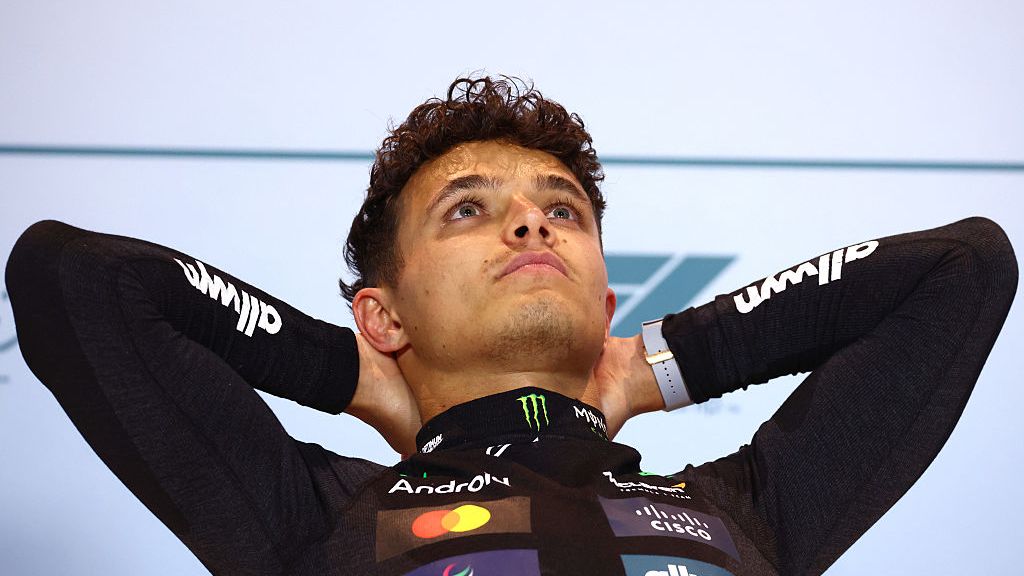Lando Norris Reflects on Miami Grand Prix: Challenges of Racing Against Max Verstappen
In the high-octane world of Formula 1, Lando Norris recently expressed his thoughts on the complexities of racing against Max Verstappen during the Miami Grand Prix. The race proved to be a challenging experience for Norris, particularly after a pivotal moment early on when he found himself battling with the reigning champion, Verstappen. This encounter led to a series of events that significantly impacted his race strategy and final standings.
At the outset of the Miami Grand Prix, Norris faced a setback when Verstappen pushed him wide at Turn 2, causing Norris to drop from a promising position to sixth place. However, he managed to rally and claw his way back, eventually finishing in third place. At one point, he was less than a second behind Verstappen when his teammate, Oscar Piastri, took the lead after a fierce tussle with the Dutch driver. This battle was critical as Piastri subsequently pulled away from the pack, creating a gap of nearly nine seconds over Norris, who found it challenging to overtake Verstappen.
Norris articulated his frustrations with the situation, stating, "What can I say? If I don’t go for it, people complain. If I go for it, people complain, so you can’t win." This sentiment encapsulates the difficult balance drivers must strike in the competitive environment of Formula 1. Norris acknowledged that racing against Verstappen is a unique challenge, saying, "It’s crash or don’t pass." He pointed out that unless a driver executes a perfect maneuver, overtaking Verstappen can be exceptionally difficult. Reflecting on his performance, Norris admitted, "I paid the price for not doing a good enough job today. I’m still happy with second."
The McLaren driver didn’t shy away from critiquing Verstappen’s aggressive tactics at the start of the race. Norris suggested that Verstappen’s defensive driving cost both drivers a better finish. "It was fine. He’s fighting hard, but it’s up to him to do that," he remarked. "He’s ruining his own race. He’s not racing very smart. We probably could have finished 1-2 today and didn’t because of that." This perspective highlights the intricate dynamics of racing where individual strategies can significantly alter the outcomes for teammates.
After finally securing second place, Norris noted that the gap to Piastri had widened significantly compared to when both McLaren drivers were engaged in their respective battles with Verstappen. Despite this, he maintained hope that he could still pressure his teammate in the closing laps of the race. "I gave it a good shot from when I got into second," he stated. "There was a long way to go — I think 25, 30 laps almost at that point. I probably only stopped pushing the last four to five laps." The gap had diminished from nearly ten seconds to around four or three seconds, which demonstrated Norris’s tenacity and commitment to the race.
Norris continued to emphasize the challenges he faced throughout the race, declaring, "I tried the whole race, basically, until the very end. I kept belief the whole race, but Oscar’s driving well. He’s quick." The acknowledgment of Piastri’s skill underscores the competitive spirit that exists within the McLaren team, highlighting that while they are teammates, they are also rivals on the track. Despite the difficulty in closing the gap from ten seconds, Norris felt proud of his efforts, stating, "I gave it a good shot. I almost got there. Just not enough laps."
The Miami Grand Prix showcased the competitive landscape of Formula 1, where drivers must navigate not only their strategies but also the unpredictability of racing dynamics. Norris’s reflections provide insight into the mindset of a driver who is constantly weighing the risks and rewards of aggressive racing. The interplay between teammate dynamics and racing strategies is a critical part of the sport, as evidenced by Norris’s experience in Miami.
Drivers like Norris and Verstappen are often caught in a delicate balance between aggression and strategy. As they navigate the challenges of overtaking and defending positions, the pressure to perform at the highest level is ever-present. Each race serves as a reminder of the fine line between success and failure in a sport that demands not only speed but also tactical acumen.
In conclusion, Lando Norris’s experience at the Miami Grand Prix highlights the complexities and challenges of Formula 1 racing. His candid reflections on racing against Max Verstappen reveal the intricacies of competition, where decisions made in the heat of battle can have lasting impacts on race outcomes. As the season progresses, fans and analysts alike will continue to observe how these dynamics unfold, shaping the narratives of the drivers and their teams in the quest for victory.
